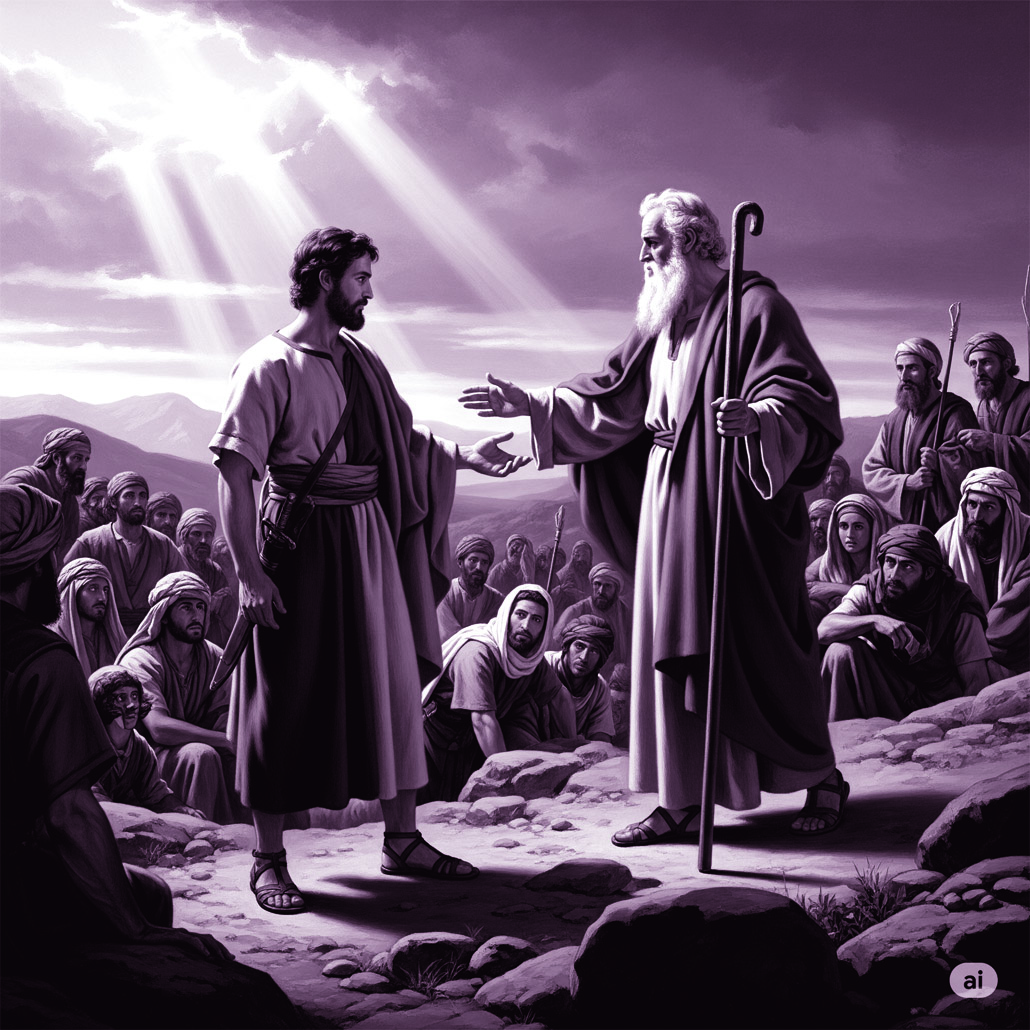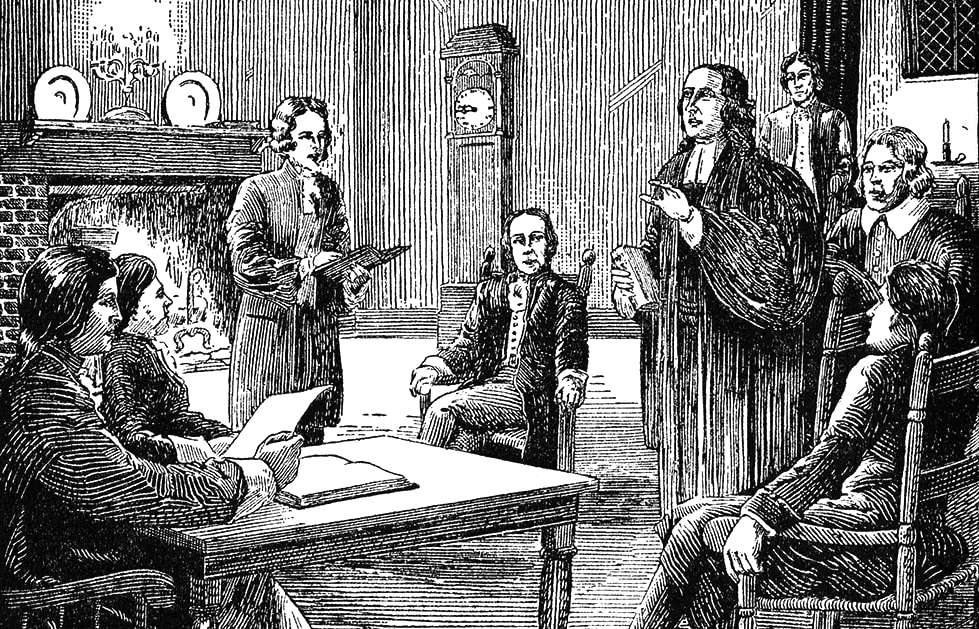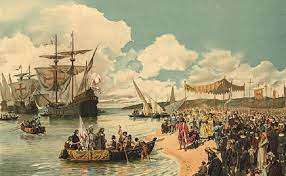

The Commission of Joshua
Pr. Abraham Chacko
The commission of God is a divine mandate that authorizes, empowers, and directs a person for ministry. It is not merely a human decision or an ambition, but an assignment given by God Himself for the fulfillment of His purposes on earth.
It is important to distinguish between calling and commission. Calling for ministry is an inner sense and conviction to pursue God’s purpose. Commission, on the other hand, is the act of being formally appointed, authorized, or sent out to perform a specific role or duty. Throughout Scripture, God has always commissioned individuals as prophets, kings, apostles, and servants; each uniquely suited to their specific context, where God chooses to carry out His work. Among them, Joshua, the successor of Moses, stands out as a powerful example of what it means to be commissioned by God for leadership and ministry.
The foremost feature of the commission of God is that it imparts authority. Ministry is assigned not on personal merit but on divine assignment. True ministry is grounded in the authority of God who sends, not in ability of the one being sent. A. W. Pink says that Joshua exemplifies the leader who is both a man under authority and a man of authority. His strength lay in his submission to God’s will. Moreover, the commission of God provides purpose and direction, without which ministry can become directionless or driven by personal agenda. God’s commission gives clarity about what to do, where to go, and how to serve. The commission brings divine empowerment and presence, along with wisdom and spiritual gifts. God never sends someone without also equipping them. This enables the servant not only to begin the work, but also to persevere through trials and opposition.
The commission of God also brings accountability and faithfulness, and being answerable to God. This produces a sense of holy responsibility. Ministry is a trust given by God, not something to be taken lightly. This mindset guards from pride, compromise, and burnout. The commission of God ensures that ministry bears eternal fruit. Human efforts may produce temporary results, but only ministry aligned with God's will and empowered by His Spirit leads to lasting impact. In ministry, commissioning includes all believers who are called to serve in various capacities, like pastoral, missionary, teaching, caregiving, or administrative roles.
The story of Joshua, particularly as recorded in Joshua 1:1–18, reveals critical aspects of God’s commissioning: divine authority, the centrality of obedience, the assurance of God’s presence, and the need for courage. Joshua’s ministry serves as a model for all who are called to lead or serve in God’s kingdom.
The Preparation of Joshua for Leadership
Joshua learned leadership through observation and mentorship. Before stepping into the monumental role of leading the Israelites into the Promised Land, Joshua served faithfully as the assistant of Moses. His years in this position were not just a time of service but a divine preparation that shaped his character, leadership, and spiritual insight. His experience was foundational for his later success.
Joshua witnessed firsthand how Moses dealt with the immense responsibility of guiding a difficult and often rebellious people. From interceding for the Israelites after the golden calf incident (Exodus 32) to organizing the judicial structure (Exodus 18), Moses handled political, spiritual, and military matters with great dependence on God. Joshua, being close to Moses, had a direct view of all these experiences. This exposure taught him not only practical leadership skills, but also the importance of seeking God's guidance in every decision. Matthew Henry says that Joshua was a man in whom was the spirit of wisdom. He was bold in faith, careful in counsel, and steady in execution.
Joshua was trained in spiritual disciplines. One significant moment is found in Exodus 33:11, where it says that after Moses spoke to God face-to-face in the tent of meeting, Joshua remained in the tent. He displayed a deep hunger for God's presence. While Moses was the prophet, Joshua was learning to be a man of God in his own right. Such experiences nurtured his faith and prepared him to be a spiritual leader who would carry forward God’s promises.
Joshua gained military experience. One of Joshua’s earliest demonstrations of military leadership came during the battle against the Amalekites in Exodus 17. While Moses prayed on the hill, Joshua led the army into battle. This early experience gave him practical battlefield training and taught him the importance of depending on both human effort and divine intervention. He learned that victory was not merely a matter of tactics, but of trusting in God. Warren Wiersbe says that Joshua was a great general because he first learned to be a great servant. He won victories because he listened to God and obeyed Him, not because he trusted in human strategies.
Joshua learned submission and humility. Despite being a capable leader in his own right, Joshua never sought to usurp Moses. He faithfully followed and submitted to Moses’ leadership. This humility was recognized by God, who eventually chose Joshua to be Moses’ successor (Numbers 27:18–23). His years of service taught him to wait on God’s timing rather than pursue leadership prematurely.
Joshua learned the weight of responsibility. He saw how Moses bore the burden of the people, how leadership could be lonely, and how disobedience to God carried serious consequences. These lessons likely influenced his own leadership style. Charles Swindoll says that Joshua succeeded because he didn’t try to be Moses, rather he trusted God to work through him as Joshua. This trait is the mark of a secure and faithful leader.
Joshua’s experience as Moses’ assistant was a divine training ground. He learned leadership, spiritual devotion, military strategy, and humility. These years of faithful service prepared him not only to take over Moses’ role but to do so with wisdom, courage, and dependence on God. His story reminds us that before God gives a public platform, He often leads us through seasons of private preparation.
His Commissioning
Following the death of Moses, God directly commissions Joshua to lead Israel into the Promised Land. This was a pivotal moment in Israel’s history, and highlights key principles about God’s commissioning. God’s work does not end with the passing of one leader. Joshua is not called to invent a new vision but to continue the mission God began through Moses. This teaches us that ministry is not about individual legacy, but faithful continuation of God’s purposes.
God assures Joshua of success, not because of his personal strength, but because of God’s faithfulness. This is followed by a powerful declaration of the promise of God’s presence. The presence of God is the most vital resource for anyone commissioned for ministry. Like Joshua, leaders today face daunting tasks, but God’s presence guarantees they are not alone. Andy Stanley says that leadership is always a matter of navigating uncertainty. The greater the uncertainty, the more people will look to you for clarity, even when you don’t have it.
Overcoming Leadership Pressures and Fear
Leadership transition is never easy, especially in following the footsteps of a giant. Joshua faced this very challenge. Before Joshua could even lead, he had to grapple with the legacy of Moses. Joshua had to deal with the enormous pressure of stepping into Moses' role, leading a generation that had known only Moses, and carrying the responsibility of fulfilling the long-awaited promise of entering the Promised Land. Joshua faced and overcame this pressure through God’s commissioning, obedience, courage, and spiritual dependence.
Succeeding Moses, the greatest prophet and leader Israel had known, was no small task. Moses had stood before Pharaoh, parted the Red Sea, delivered God’s law, and led the Israelites through the wilderness for 40 years. He was revered not only by the people but also by God Himself, who called him a faithful servant (Numbers 12:7). Moses had been a father figure to the people, a prophet, a lawgiver, and an intercessor. His leadership had shaped Israel’s identity. Now, the mantle of leadership had fallen on Joshua, Moses’ assistant.
Joshua would always live in Moses’ shadow. The people’s affection for Moses, along with their skepticism of new leadership, meant Joshua’s authority had to be established with great care. This kind of pressure—living up to an idealized predecessor—can create fear and insecurity. But Joshua’s response was not to imitate Moses or compete with him. Instead, he accepted his role with humility, understanding that his calling was different yet equally important. Joshua was not called to be a prophet like Moses but a conqueror, a leader to take the people into the land Moses had only seen from a distance.
God understood the emotional weight Joshua was carrying. In Joshua 1:1–9, God personally commissioned Joshua with promises and commands that directly addressed his fear and insecurity. This assurance was pivotal for Joshua. God did not downplay Moses’ greatness but reassured Joshua that the same divine presence that empowered Moses would now be with him. The transfer of divine presence was more important than the transfer of leadership. Maxwell says that everything rises and falls on leadership, but few understand the heavy weight leaders carry until they wear the mantle themselves.
God also told Joshua repeatedly to be “strong and courageous” (Joshua 1:6, 7, 9). This repeated exhortation underscores the emotional and spiritual strength needed for ministry. Ministry often involves conflict, opposition, and spiritual warfare. Without courage, the commissioned leader cannot stand firm. God was shifting Joshua’s focus from the greatness of Moses to the greatness of God Himself. This gave Joshua the courage to lead with confidence, not comparison.
Unlike Moses, who received direct revelations, Joshua was told to rely on the written Word of God. Rather than attempting to match Moses’ prophetic voice, Joshua remained a student of God's Word, showing that ministry is not about replicating your predecessor’s style but about faithfully obeying God in your own context. This revealed that obedience, not charisma or cleverness, would be the foundation of Joshua’s success. His leadership decisions like crossing the Jordan, the conquest of Jericho, and dividing the land, all were grounded in listening to God’s instructions. John Maxwell says that Joshua was a leader who understood that success follows obedience. His leadership was marked not by charisma, but by consistency in following God’s direction.
Joshua did not try to copy Moses’ leadership style. While Moses was a mediator and lawgiver, Joshua was a warrior and strategist. While Moses parted the Red Sea; Joshua parted the Jordan River. While Moses received the law; Joshua implemented the law. While Moses led a wandering generation; Joshua led a conquering generation. Joshua accepted that his role was not to be another Moses, but to lead in a new season. Many leaders falter under pressure because they try to be someone they are not. Joshua teaches us that courage includes embracing your own calling and leading with authenticity.
Succeeding a legendary leader like Moses was a daunting task. The pressure to perform, the weight of expectation, and the fear of comparison could have paralyzed Joshua. But he overcame these pressures not by human strength but by relying on God’s promises, God’s Word, and God’s presence.
Joshua teaches us that great leaders are not born in the shadow of others but rise in their own calling by trusting God who called them. In every generation, God raises leaders not to imitate the past but to fulfill His purposes in the present. Joshua’s story reminds all who are called to ministry or leadership that success comes not from trying to be someone else, but from being faithful to God's call and walking courageously in His strength.
In a world that often celebrates personal ambition and charisma, Joshua’s example calls us back to the heart of ministry: serving God’s purposes in God’s way, whether leading a congregation, discipling a small group, or serving behind the scenes. The invitation to ministry is both a privilege and a responsibility. Joshua is a strong reminder to us to hear God’s call, receive His commission, and step forward with strength and courage.



